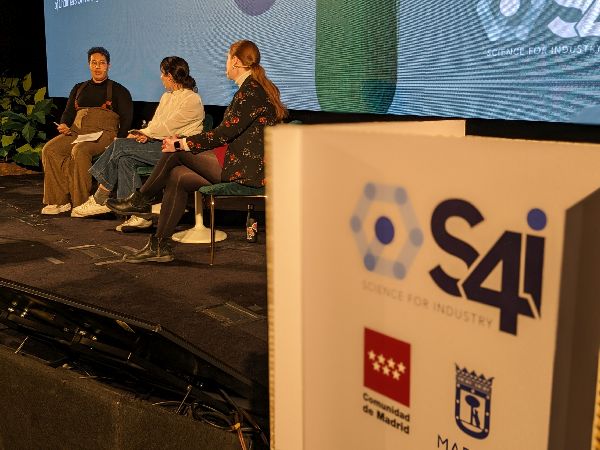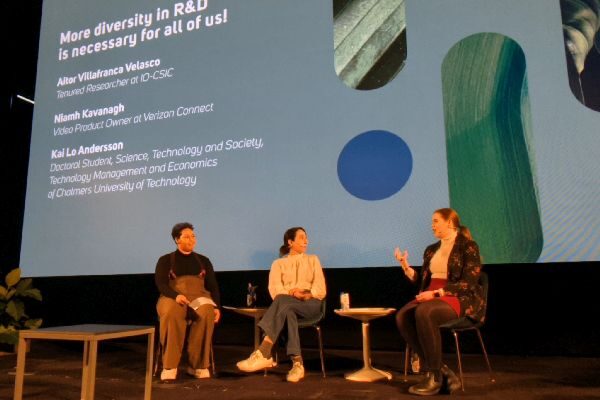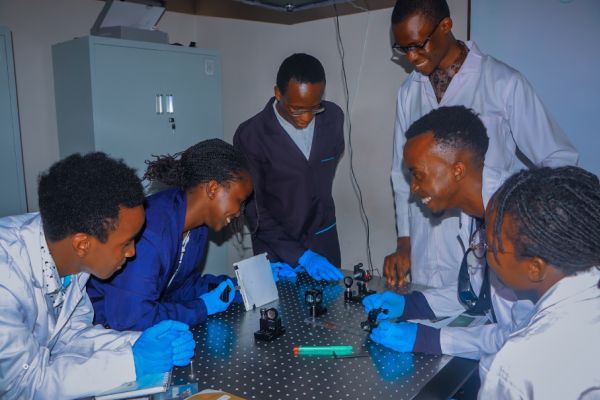Written By: Niamh Kavanagh, Past IEEE Photonics Society AVP Diversity
Science for Industry (s4i) was an international meeting point for Deep Science, organized by Universidad Autónoma de Madrid and BeAble Capital which took place in La Nave, Madrid on January 18th and 19th 2024. The ethos of s4i is an economic model based on knowledge. They believe in the great potential of science to ensure our future and the cutting-edge competitiveness of Europe, and that improving the process of commercializing new technologies will generate a massive boost for the EU economy. S4i was a great success in terms of connecting universities, research centers, leading companies and Science Equity funds from all over the world. Among the different events featured was the Facing Challenges Summit, this international summit on Science Equity was a unique and exclusive event that gathered the main investment funds in Deep Science and the most representative international institutions, curated by BeAble Capital, the leading South Europe Science Equity fund, organizer of Science for Industry.
As we all know, diversity in research and development (R&D) has become a crucial imperative to drive innovation and ensure a positive impact on all spheres of society. As part of the Facing Challenges Summit, Aitor Villafranca Velasco (IPS Pride In Photonics Chair) organized a round table conversation with the title: “More Diversity in R&D is Necessary for All of Us!”. This roundtable discussion explored the critical role that inclusion plays in generating breakthrough ideas and sustainable solutions. I was very honored to take part in this roundtable discussion, alongside Kai Lo Andersson from Chalmers University and moderated by Jimena García-Romeu, CEO of Alcyon Photonics. As part of this discussion, we considered two main questions, the first; Why is diversity needed in industry? And secondly; What actions can we take to get more diversity in industry?

Why is diversity needed in industry?
On the first question, I posited that the three main reasons why diversity and inclusion is important in industry is that it helps us to (1) attract top talent, (2) retain them & (3) get the best out of our talent.
1. Attracting Tech Talent:
Diversity isn’t just a checkbox; it’s a strategic magnet for top-tier tech talent. 80% of job seekers consider diversity important when evaluating companies (“Why Is Diversity and Inclusion Important? Explore Key DEI Stats”, LinkedInLearning), recognizing it as the bedrock of innovation. This isn’t just a statistic; it’s a call for tech leaders to champion inclusive cultures that resonate with tech talent. Transparent and impassioned leadership is paramount. 60% of tech professionals want to hear business leaders speak up on diversity issues (“Why Is Diversity and Inclusion Important? Explore Key DEI Stats”). I believe that we should invest, not just in technology, but in a future where we recognise that diversity fuels innovation.
2. Retaining Tech Talent:
Talent retention in the tech sector transcends competitive compensations; it relies on cultivating a workplace culture that truly values and nurtures brilliant minds from all backgrounds. When employees trust that they, and their colleagues, will be treated fairly regardless of race, gender, sexual orientation, or age, they are nearly ten times more likely to look forward to going to work and five times more likely to want to stay a long time at their company (“Why Is Diversity and Inclusion in the Workplace Important?”, Great Place To Work). These statistics underscore the profound impact of a supportive and inclusive work environment on talent retention in the high-profile tech arena.
3. Getting the best out of your talent
The evidence on this point is compelling: inclusive teams, boasting a mix of backgrounds and perspectives, surge ahead in productivity, demonstrating a remarkable 35% increase in output. Moreover, the correlation between diversity and effective decision-making is staggering, with diverse teams making superior choices 87% of the time. Beyond just decision-making prowess, the financial implications are substantial, as companies who embrace diversity are 70% more likely to tap into and conquer new markets and earn a whopping 2.5 times higher cash flow per employee (“Insights on Diversity and Inclusion”, McKinsey). These statistics underscore that diversity is not just a moral imperative; it is a strategic advantage, propelling businesses toward heightened productivity, smarter decision-making, and robust financial success. Within the tech sector, we hold the reins to a tech future where diversity isn’t just embraced; it’s recognized as the driving force behind innovation and business success.
What actions can we take to get more diversity in industry?
In terms of the second question, I put forward the following action plan:
1. Establish and Enforce Diversity Metrics:
We can establish diversity metrics, incentivize inclusive initiatives, and support training programs. Technology investors, policymakers, and EU institutions can implement a system of robust diversity metrics, tracking key indicators such as gender, ethnicity, and other underrepresented demographics at all organizational levels. Success can be measured by regularly assessing these metrics, aiming for tangible increases in diverse representation over time.
2. Incentivize Diversity and Inclusion Initiatives:
Diversity can be a starting point, but without true inclusion, diversity doesn’t stick. Policymakers and EU institutions can create incentives for companies to prioritize diversity and inclusion initiatives. For example, offering financial rewards or preferential treatment to organizations that actively support Employee Resource Groups, engage in volunteering, or demonstrate a commitment to corporate social responsibility. Success can be measured by the increased participation of companies in these initiatives and the positive impact observed in their diversity metrics.
3. Support Diversity and Inclusion Training Programs:
Technology investors can allocate funding to support comprehensive diversity and inclusion training programs within companies. This should go beyond basic awareness training to action-based bystander intervention, inclusive leadership, and cultural competence, for example. Success can be measured through the assessment of changes in employee attitudes, increased representation in leadership roles, and a noticeable improvement in overall workplace culture, as reflected in employee satisfaction surveys and retention rates.
In all these actions, ongoing monitoring and regular reporting will be crucial. However, success should not only be determined by numerical improvements but also by the creation of an inclusive, supportive, and welcoming workplace culture where all individuals, inclusive of their background, feel valued, can contribute to their full potential, and have equitable opportunities for growth and advancement. Periodic reviews, surveys, and external audits can provide comprehensive insights into the effectiveness of these actions in fostering a diverse and inclusive tech ecosystem.
Thank you to Science for Industry (s4i) and the IEEE Photonics Society for their support in attending this event.
Works Cited:
“Insights on Diversity and Inclusion.” McKinsey, https://www.mckinsey.com/featured-insights/diversity-and-inclusion. Accessed 23 February 2024.
“Why Is Diversity and Inclusion Important? Explore Key DEI Stats.” LinkedIn Learning, https://learning.linkedin.com/resources/learning-culture/diversity-workplace-statistics-dei-importance. Accessed 23 February 2024.
“Why Is Diversity and Inclusion in the Workplace Important?” Great Place To Work, https://www.greatplacetowork.com/resources/blog/why-is-diversity-inclusion-in-the-workplace-important. Accessed 23 February 2024.
Social media posts from the event:
- Twitter: https://twitter.com/NiamhTalking90/status/1748300088340812132 & LinkedIn: https://www.linkedin.com/posts/niamhtalking90_diversity-equity-inclusion-activity-7154062258594074624-wGF7?utm_source=share&utm_medium=member_desktop
- Twitter: https://twitter.com/NiamhTalking90/status/1748301604862804064 & LinkedIn https://www.linkedin.com/posts/niamhtalking90_diversity-equity-inclusion-activity-7154063664814182400-iVla?utm_source=share&utm_medium=member_desktop

Dr. Niamh Kavanagh (she/her) is a photonics doctorate and video product owner at Verizon Connect where she pioneers innovative AI-powered dashcams to prevent road accidents. She actively contributes to Verizon’s inclusivity as a board member for employee resource groups such as WAVE and Prism, and as a Lean-in Circle leader. With a background as the past chair of the IEEE Photonics Society Global Diversity Oversight Committee and founder of the Pride in Photonics initiative, Dr. Kavanagh chose a career in tech to follow her curiosity and find a place in life where she could make a positive difference.




